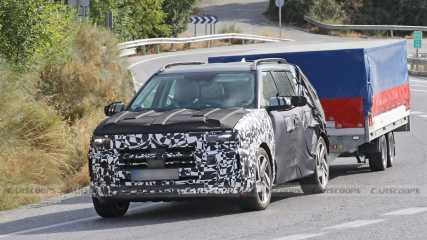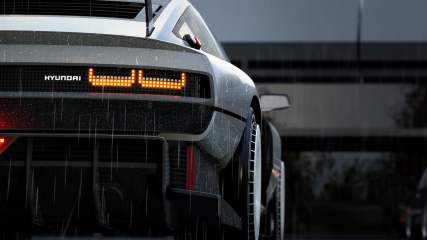Hydrogen

Game-changing new family SUV spotted testing: Next-gen hydrogen-powered Hyundai Nexo SUV set for Australia as an alternative to the Tesla Model Y, Hyundai Ioniq 5 and Kia EV5 battery electric cars
Read the article
By Samuel Irvine · 24 Sep 2024
The next instalment of Hyundai’s long-awaited hydrogen SUV has been spotted testing under heavy disguise ahead of its global debut next year.
.jpg)
Surprising brand signs up to hydrogen cars: Skoda announces partnership with Hyundai to advance hydrogen fuel cell capabilities
Read the article
By Samuel Irvine · 23 Sep 2024
Skoda has become the latest automaker to decide it wants in on Hyundai's hydrogen fuel cell capability.

This brand wants to revolutionise Australia's commercial vehicle sector
Read the article
By Samuel Irvine · 23 Sep 2024
Foton is out to revolutionise the commercial vehicle segment in Australia, one electrified truck at a time.
.jpg)
A hydrogen-powered Chevrolet Silverado? Hyundai and GM sign clean energy agreement paving the way for collaboration on EVs and hydrogen vehicles
Read the article
By Samuel Irvine · 16 Sep 2024
Just weeks after Toyota and BMW signed a strategic partnership for the development of hydrogen vehicles, GM and Hyundai have joined the party, announcing a memorandum of understanding that paves the way for future collaboration on clean energy vehicles.
.jpg)
'People want to pick a winner': Why Hyundai continues to forge ahead with hydrogen fuel cell technology along with Toyota and BMW in spite of strong opposition
Read the article
By Samuel Irvine · 31 Aug 2024
In the global push to decarbonise the automotive industry, there are often two opposing camps, those who believe solely in battery electric power, and those who embrace a mixture of technologies, including hydrogen.

BMW joins forces with Toyota to develop hydrogen-powered cars
Read the article
By Samuel Irvine · 29 Aug 2024
Toyota will band together with BMW to develop hydrogen technology, in what is the biggest indication yet that BMW is gearing up to enter a hydrogen-powered vehicle into the mainstream market.According to Nikkei Asia, the Japanese and German automakers are set to sign a memorandum of understanding confirming the partnership next week, with an announcement expected during BMW’s round table media event on September 5.It’s the latest evolution of a hydrogen partnership that dates back to 2012, when Toyota agreed to supply BMW with a limited number of hydrogen fuel cell components.This agreement will pave the way for a more comprehensive partnership, with Toyota supplying BMW with more sophisticated hydrogen tanks and fuel cell systems. According to Nikkei Asia, BMW will then use its in-house EV technologies to manufacture the rest of the vehicle.The announcement doesn’t come as a surprise, given that Toyota is already a well-established player in the hydrogen fuel cell segment, and BMW has increasingly expressed interest in producing a hydrogen cell vehicles for the mainstream market.BMW recently toured its hydrogen powered iX5 hydrogen prototype – which is built on the X5 SUV platform – across Australia in July, while Toyota introduced its hydrogen powered Mirai, one of two hydrogen vehicles available in Australia, on a special leasing agreement back in 2021. The Mirai has been offered in Japan since 2014.Hyundai is the only other brand in Australia with a hydrogen passenger vehicle, the Nexo SUV, which it distributes under a similar leasing scheme. The ACT and QLD governments are two of Hyundai’s biggest leasing partners for the Nexo. Each government leased a fleet in 2021 which they have both extended as of this year.The arrangement with Toyota may bring down the cost of any prospective hydrogen vehicle from BMW, although questions persist — particularly in Australia — about the feasibility of selling a hydrogen vehicle to the public.Hydrogen fuel cell vehicles run on electricity generated through a chemical reaction created between hydrogen and oxygen, with their only tailpipe emission being water.Their range and refuelling time is considered to be better than EVs, with the technology presenting itself as an attractive alternative as the demand for EVs begins to plateau.There are just 12 hydrogen refuelling stations in Australia, with the cost of delivering hydrogen infrastructure here remaining incredibly high. The CSIRO’s hydrogen refuelling and production station in Melbourne, for example, cost $2.5 million to build, but only generates enough fuel capacity for roughly 10 vehicles per day.BMW may struggle less in Germany though, where a network of 86 refuelling and production stations puts Germany as one of the global leaders when it comes to hydrogen refuelling infrastructure.Toyota Australia signed a memorandum of understanding last year with Hyundai, energy-giant Pacific Energy and fuel retailer Ampol to drive local infrastructure expansion.Hyundai’s XCIENT Hydrogen Fuel Cell trucks already operate across Europe on a commercial scale, with Hyundai and Toyota particularly adamant that hydrogen technology will first establish itself in the transport industry before it becomes available on a mainstream scale in passenger cars.
.jpg)
Better than a battery electric vehicle? Meet the 2025 BMW iX5 Hydrogen - the zero emissions SUV for towing and long-distance driving that could one day replace petrol and diesel models like the Toyota Prado and Land Rover Defender
Read the article
By Tom White · 09 Jul 2024
Meet BMW's Hydrogen-powered X5 as the brand promises an alternative zero emissions future.
.jpg)
Why hydrogen fuel cell vehicles will make decarbonising more affordable and sustainable than electric cars alone: BMW says hydrogen must be part of its model mix
Read the article
By Tom White · 30 Jun 2024
BMW says hydrogen must be a part of a lower-cost electric future.
.jpg)
2025 Hyundai Nexo: Australia will 'definitely' see Hyundai's next-gen hydrogen technology as the Korean brand eyes ACT as an ideal test-case for hydrogen-based 'community'
Read the article
By Tom White · 07 Jun 2024
Hyundai says hydrogen is still a long play, but earmarks the nations capital as the perfect spot for a 'hydrogen community'.

Eye-popping supercar from unlikely brand: Hyundai N Vision 74 Concept to be a hydrogen-fuelled Ferrari 296 GTB, Porsche 911 and Lamborghini Revuelto smasher
Read the article
By Dom Tripolone · 28 May 2024
Hyundai is set to make its head-turning supercar concept a reality.The striking N Vision 74 concept, which debuted in 2022, will enter production from 2026 according to a report from Korean newspaper Hankung.It’s not just its wild looks that are eye-opening, it’ll also be hydrogen-powered according to the report.The hydrogen fuel cell, which converts hydrogen to electricity with water the only tailpipe emission, will feed an electric motor that sends at least 578kW to the rear wheels.It will be able to sprint from 0-100km/h in about three seconds.Hyundai is only going to produce 200 of the supercars and it is likely to be priced at more than $550,000 if it ever makes it to Australia.The South Korean brand is one of the few car makers well advanced with hydrogen fuel cell technology, along with BMW, Honda and Toyota.Hyundai has had a fleet of its Nexo hydrogen fuel cell SUVs in Australia since 2021.The cars are not for sale but were instead part of a trial for the emerging technology and were leased to companies and government fleets.Toyota had a similar trial in Australia with its Mirai hydrogen fuel cell vehicle.The problem with hydrogen in Australia is the lack of refuelling infrastructure with fewer than 10 facilities nationwide.There are plans afoot to quench the drought of hydrogen refuelling stations, though.In October, 2023, Hyundai and Toyota signed a memorandum of understanding with Ampol and Pacific Energy to develop a wider network of refuelling stations.“Toyota has joined forces with three other industry heavyweights to accelerate the reality of a hydrogen society built upon clean and renewable energy technology,” Toyota Australia said at the time.“We have signed a memorandum of understanding with Hyundai Australia, Ampol and leading hydrogen technologies specialist Pacific Energy to help develop hydrogen refuelling infrastructure.“This partnership agreement brings together four like-minded companies that are all leading proponents of Australia’s growing hydrogen economy.“Both Toyota and Hyundai have fuel-cell electric vehicles in customer programs while Ampol and Pacific Energy are heavily invested in growing sustainable energy development and distribution."Hydrogen isn’t believed to be widely adopted in passenger cars in the near future but is seen as a zero-emissions solution for heavy transport. The weight and cost associated with giant batteries for heavy vehicles is a roadblock to them going electric.Producing hydrogen is extremely energy intensive and costly, though.Green hydrogen is the term used to describe hydrogen made using renewable energy such as solar, but there are few applications of this globally.




